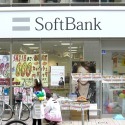
Masayoshi Son, the megalomaniacal boss of Japan's SoftBank, attaches little importance to sales and profits, the measures that many investors deem essential when assessing a company's performance. "The only measure by which SoftBank, an investment company, should be evaluated by is whether shareholder value rises or falls," he reportedly said earlier today after his business published results for its December-ending quarter.
Shareholder value? This made-up metric, according to Son, is defined as the equity value of holdings minus interest-bearing net debt. In SoftBank's case, that produces a figure of $228 billion, based on share prices today. Backtrack to September 30 and SoftBank's "shareholder value" was only $187 billion, notes the company in its latest investor presentation. Investors should be rejoicing, is the implication: Adding $41 billion of "value" in just four and a half months is surely an impressive feat.
Traditionalists may take some convincing. The Japanese company's Vision Fund – which, on a mission for world technological domination, has invested in everything from ARM to WeWork – swung to a $2.1 billion operating loss for its fiscal third quarter, after reporting a profit of about $1.6 billion a year earlier. That does not look like value creation.
Despite his reputation as an astute judge, Son has made some disastrous bets. His very worst include Uber, a ride-hailing app developer, and WeWork, a badly run provider of shared workspace with a tenuous claim to be a technology company. While Uber's share price has recently been rising, it racked up a net loss of $8.5 billion in its last fiscal year. Last year, WeWork famously required a $9.5 billion SoftBank bailout after losing almost $1 billion in the first six months.
SoftBank insists the "tide is turning," an expression it uses in its latest investor presentation against an image of crashing waves. A chart that resembles a heart monitor shows that losses at the Vision Fund have narrowed since the second quarter, when they were a heartbeat-skipping $8.8 billion. Unsurprisingly, given its boss's share-price obsession, SoftBank starts its presentation with a graphic produced at the last-minute to show the rise in Sprint's valuation after the US operator moved closer to a merger with T-Mobile, its larger rival.
Not until slide 11 does the reader see what is happening in the mundane world of Group quarterly earnings. Net income for the first nine months dropped by more than 1 trillion Japanese yen ($9.1 billion), compared with the year-earlier period, to JPY476.6 billion ($4.3 billion). Sales were down 1.1%, to about JPY7.1 trillion ($64.5 billion). The company's "SoftBank segment," which refers mainly to the domestic telecom business, was the only one of its overarching units to record sales growth. These days, it accounts for only about half of total revenues.
For all the latest news from the wireless networking and services sector, check out our dedicated Mobile content channel here on Light Reading.
After the positive news about Sprint and T-Mobile, and recent improvements at Uber and WeWork (including management changes at the latter), SoftBank's share price gained 12% on the Tokyo Stock Exchange today. That movement on its own would suggest investors are delighted with the company's performance. Yet Elliott Management, an activist shareholder, reckons the firm is undervalued and is reportedly pushing for changes.
Elliott is known for making a nuisance of itself in the telecom sector, having recently grumbled about the performance of AT&T and Telecom Italia, besides SoftBank. The more glaring sign of investor unhappiness is the lack of interest in Vision Fund 2, Son's even more ambitious follow-up to the initial investment scheme. Today, he was forced to admit that his investment activity had caused some "anxiety" and that Vision Fund 2 is likely to be a smaller affair.
For Elliott and analysts who track SoftBank, a big problem is the lack of transparency when it comes to Vision Fund's activities. SoftBank says about 30 companies in the portfolio recorded gains, while roughly another 30 made losses, but it provides few other details. To skeptics mindful of the setbacks at Uber, WeWork and even Sprint in the last year – as well as SoftBank Group's vast debts of about $122 billion – the talk of shareholder value must all seem like smoke and mirrors.
Related posts:
— Iain Morris, International Editor, Light Reading
Read more about:
AsiaAbout the Author(s)
You May Also Like











